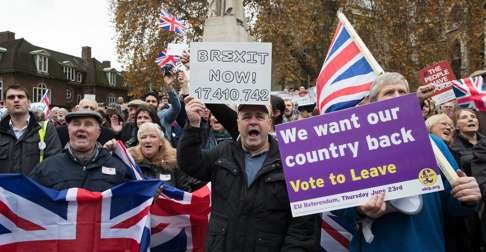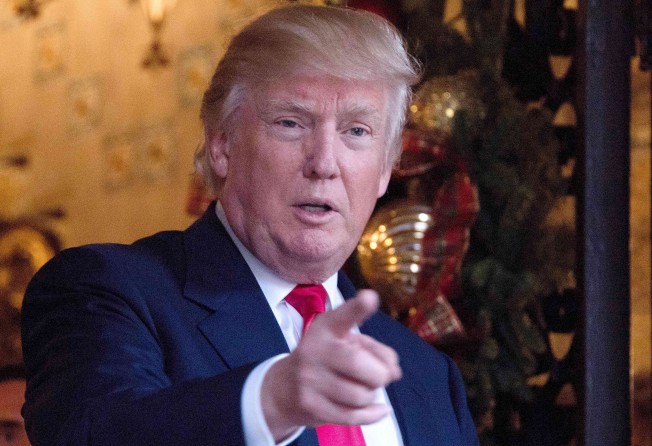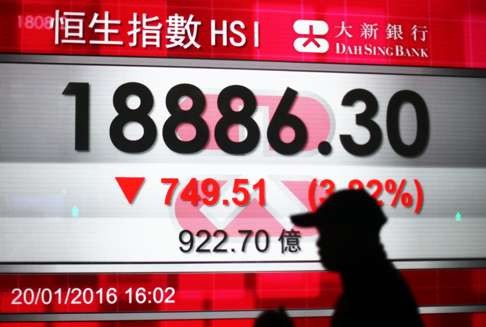
In turbulent year, mainland stock rout takes centre stage as global market mover
Political upsets in Britain and Italy had an impact on an already wobbly Europe but for worldwide fallout, Trump’s win in the US election and share rout take top honours

Which event, more than any other, had a decisive impact on global markets this year?
The word global is the key because many events hit individual markets really hard but to qualify for a global market changer, we need something more profound.
Let’s start however with some pretty substantial local events that, perhaps in other circumstances, would have had a more profound global impact. Earlier in the year Japan decided to lower interest rates to less than zero; by any standards that was a pretty bold decision but its global impact – in a very low rate environment – was underwhelming.
More recently the decisive referendum rejection of Italy’s then-Prime Minister Matteo Renzi’s reform plans and his subsequent resignation might have sent shock waves throughout European markets but in a zone where Spain, for example, barely has a government it proved not too unsettling not least because Britain’s decision to pull out of the European Union gave rather more cause for upset.
So why did the Brexit vote not qualify as one of the more substantial events of the year? It certainly made an enormous impact on the market for sterling and the initial response to Brexit did indeed provoke a global flurry but the flurry subsided, not least in Britain itself.

That leaves us with the election of Donald Trump as United States president, followed by the Dow Jones Industrial Average hitting some new highs and the US dollar soaring into the stratosphere. Trump has overcome his, er, natural modesty to claim credit for this but there are some boring old market observers who point to the fact that the US economy is in pretty good shape, certainly good enough for the US Fed to chance its arm on a rate rise (with more to come) and certainly good enough to offer the prospect of improved corporate profitability. In other words the buoyant state of US markets may well have been evident regardless of who was elected president. More importantly, from a global point of view, what is happening in US markets is curiously detached from how markets have been reacting elsewhere.
This brings us to the really important global market event of 2016. It came in January when the Chinese stock markets caught a bout of jitters and authorities responded in an almost unbelievably cack-handed manner that turned a slump into a rout, whipping 26 per cent off the markets’ value by the end of the month.
What followed impacted not only global share prices but also caused currency mayhem and led to the biggest drop in oil prices for 13 years. Investors suddenly woke up to the fact that the country which had been leading the global growth stakes was not going to deliver this kind of growth for the foreseeable future, it put into question the government’s competence in handling this reversal and changed some important assumptions about investment allocation.

In other words investors caught up with economic reality, arguably a reality that was there for all to see but required a dramatic event to concentrate minds and shake the investment community into action.
It was former US President Bill Clinton’s political adviser, James Carville, who coined the much-quoted slogan, “it’s the economy stupid”. His mantra of ignoring all the other clamouring noises and focusing on the economy has consistently proved to work because while markets are swayed by all manner of political and other events, at core they return to economic reality.
However they do so in mysterious ways, not least in 2016 when one of the best investments has turned out to be buying bonds issued by companies with the highest risk premium. Returns on these bonds – in the range of 10 per cent to 16 per cent – entirely overshadow other money market returns and compare pretty well with equity returns in most markets outside the US.
Carville also had something to say on this subject and he said it well before the events of this year came to pass. He famously pondered the prospect of reincarnation as president or the Pope or a .400 baseball hitter, whatever that is, before realising that if you want real influence it would be better “to come back as the bond market”, so that “you can intimidate everybody”.
One of the world’s biggest bondholders is the Chinese government and its bond investments are heavily focused in US government debt, so let’s see how that pans out next year when the new Trump administration launches its much anticipated “tough” stance towards China.
Us mere mortals who do not control the universe but just seek to keep our heads above water will be approaching 2017 with some trepidation because the investment outlook is about as unpredictable as it can get. But, then again, I think that’s what was said last year.
Stephen Vines runs companies in the food sector and moonlights as a journalist and a broadcaster